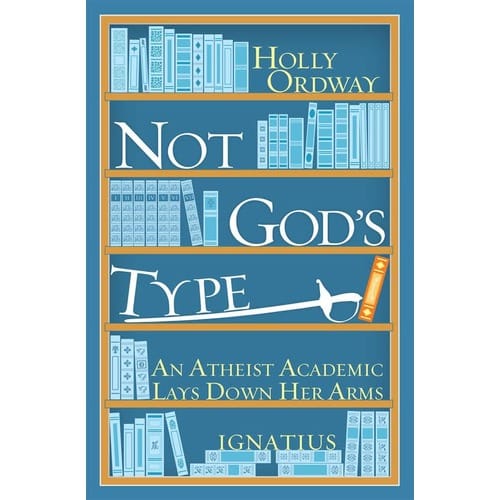At my last quarterly update of my annual reads, I mentioned I read Holly Ordway’s Not God’s
Type, a memoir of her conversion story, and low and behold she turns up as
a guest on the EWTN TV show, The Journey
Home with Marcus Grodi.
For those that aren’t familiar, The Journey Home is an interview show where the guest provides their
conversion story to the Catholic faith.
Holly Ordway was an atheist University professor of English Literature,
and her memoir took the reader through the process of overcoming her strong
atheism, compelled ultimately to believe in Christianity, and then after a few
years as an Anglican/Episcopalian converted to Roman Catholicism. Literature and philosophic reasoning was at
the heart of her conversion.
Here is the episode with Holly on The Journey Home. Be aware, there lots of literature mentioned.
But do read the book.
It’s even better than the interview.
Here is an excerpt, this from Chapter 3, “Alone in the Fortress of
Atheism.”
Behind all of my
consciously articulated views was the same premise: there is no God, no
ultimate meaning beyond ourselves.
If there is no real
meaning to our lives, what is the point of living? As early as high school, I had recognized the
problem. I remember in my junior-year
Latin class reading some of the more philosophical despairing poets, and asking
my teacher why, if they felt life was meaningless, didn’t they just kill
themselves? My teacher replied, “A lot
of them did.”
…Atheism when
consistently lived out, leads to self-deception or despair. Self-constructed meaning is only a stop-gap:
it is real only in the sense that a stage set of Elsinore Castle is a real
place. One can suspend disbelief while
Hamlet is being performed, but at some point, the curtain falls and one must
leave the theater. What’s to be done
when Helping Others, Doing Good Work, and Having Friends are recognized as
paint and canvs and trick lighting?
But it was through reading high literature that opened
her to exploring faith. Here’s another
excerpt (from Chapter 6, “Winter and Spring”) on how literature opened her to
faith.
The greatest works of
English literature spring from Christian roots.
And so, atheist though I was, when I turned back to literature I found
myself rereading poems of explicit and profound Christain faith. I rediscovered the work of T. S. Eliot,
George Herbert, John Donne, Gerard Manly Hopkins, and the Anglo-Saxon poets whose
names are lost to history. Consciously,
I dismissed their faith as antiquated, or subjective, or irrelevant; I took the
condescending view that their work was worth teaching in spite of this
irritating fascination with God. But
knowing a poem is experiential, like knowing a person. In order to teach a poem you must know it
inside and out: its nuances, its shifts of tone, its images and their play upon
the imagination. A great poem speaks
more fully and deeply upon each reading of it.
And something happened as I read.
John Keats, in “Ode to a
Grecian Urn,” closes with these words: “ ‘Beauty is truth, truth beauty,’—that is
all/Ye know on earth, and all ye need to know.”
Beauty: I had admired it, appreciated it, been moved by it, but until
now had not thought deeply about why I responded as I did. Something had changed. I could feel power thrumming in the lines of
the poems, an electricity of meaning, drawing from some source beyond my reach,
and I began to wonder what that source was.
Now that was not her conversion moment. Just a seed that would blossom later. It took a lot of philosophic jousting to
reach her faith, and Ordway takes the reader through it. The book is on Amazon for those interested.



Excellent review. It sounds like a rich and vigorous memoir that I would thoroughly enjoy.
ReplyDeleteThank you LL. I also have to thank you for recommending I read Austen's Mansfield Park. I never got a chance to post on it, but it was an excellent read.
Delete